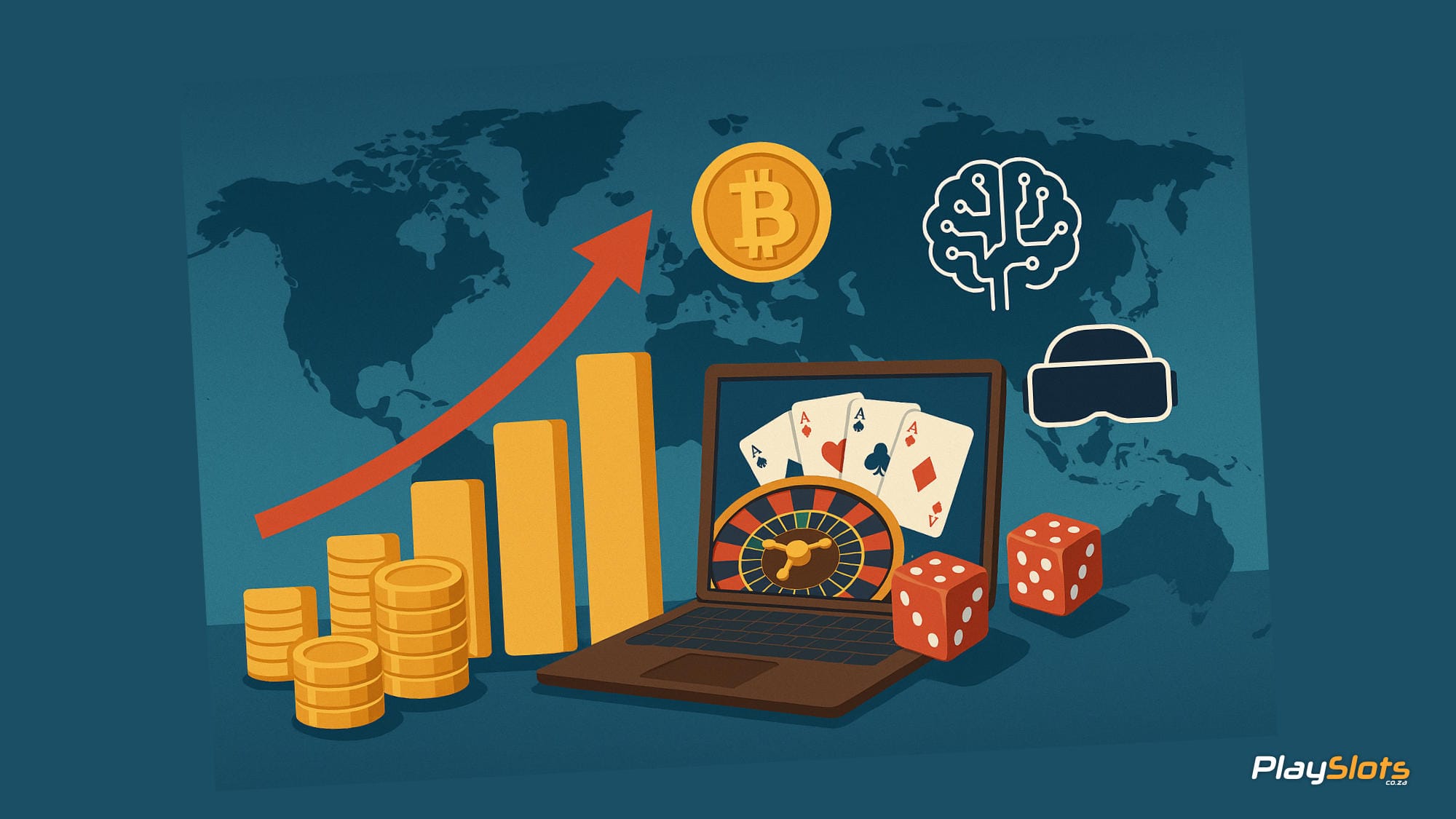What Impact Has the iGaming Industry Had on the Global Market?

The global iGaming industry is predicted to reach a revenue of $471.40 billion in 2025. In South Africa alone, R1.1 trillion was spent on online gambling between April 2023 and March 2024. To keep up with the demands of players, the iGaming industry is at the forefront of technological advances, such as cryptocurrency, AI, and virtual reality. By constantly adapting, creating innovative games, and offering superior player bonuses, the online gambling industry has left the physical gambling sector behind.
As one of the most continually profitable markets, iGaming provides economic benefits for the global economy. However, on an individual level, it can have negative financial impacts. In this article, we’ll examine both the positive and negative impacts the iGaming industry has had on the global market.
What is the iGaming Industry?
iGaming, short for interactive gaming, refers to all forms of online gambling. This ranges from casinos and slots to betting on real events, including football matches and horse racing. Players can have a similar experience to betting in real life, enhanced by graphics and sound effects, all from the comfort of their homes. Games can be played 24/7 from just a mobile phone.
Online gambling also offers a higher frequency of bonuses, such as free spins or bonus rounds, when compared to physical gambling premises. The iGaming industry is quick to adapt to technological advances, such as virtual reality and cryptocurrency. Players can use virtual reality in online casinos, for example, to heighten their experience, including by interacting with VR features such as spinning a wheel.
Online vs Physical Gambling
Between 2025 and 2029, the iGaming industry is predicted to see an annual growth rate of 3.4%, giving it a value of $538.82 billion. This incredible growth is in contrast to the decline in the turnover and player numbers of in-person gambling. Half of South African adults were estimated to have bet on sports in 2022, with 35.5% of the population using an online method to do so. Much of this change can be attributed to the opposing impact of the COVID-19 pandemic on the online and in-person gambling industries.
While the majority of the entertainment industry saw decreases in profits, with venues inaccessible due to COVID-19, the online gambling industry continued to grow. As iGaming is accessible remotely, users were able to continue gambling throughout the pandemic, even during lockdowns. In contrast, customers were not able to access in-person betting venues. Many players from in-person bookmakers converted to using online applications during this time, and providers reported increases in player sign-ups. Global Poker, an online global poker room, reported a 43% increase in the use of poker sites during COVID-19. While new players turned to the online sector throughout COVID-19, in-person bookmakers have not yet recovered.
Online slot games saw unprecedented growth during and after this time. As the global economy struggled to recover from the pandemic, many found themselves in difficult financial positions. Online slots appeal to these players by offering lower minimum stakes and lower levels of risk compared to real event betting, for example. In 2024, the online casino market in South Africa turned over R32.5 billion.
The Value of the iGaming Industry
Employment
As of February 2025, the online gambling industry in South Africa directly employs 35,000 people and supports many more jobs indirectly. The iGaming industry employs across sectors, from creative and customer service to technology and finance. These jobs provide taxes, which go towards boosting the global economy and help reduce unemployment.
The industry creates both direct and indirect jobs. Direct jobs involve roles such as live dealers and customer service providers, whereas indirect jobs involve marketing and advertising. Due to the decline in land-based operators, there has been a decrease in jobs available in this sector. However, the online sector has seen a growth in jobs. In the UK between 2019 and 2023, the number of jobs in online gambling increased by 26%. The skills developed during this employment also help develop workers for the future.
Revenue From Taxes
In South Africa, licensed gaming operators pay a tax of 9.6% on their gross revenue. The money generated by this tax online can help the Government fund key infrastructure, such as schools and health care. These contributions can also come directly from licensing fees, which range from R50,000 to R15,000. There are also annual renewal fees and application fees. In 2022, the online gambling industry within the United States generated $1.5 billion in taxes, an incredible amount to be invested across infrastructure and local economies.
There have been recent discussions on expanding taxes that impact the gambling industry in South Africa. Professional gamblers, or those who gamble frequently, have to declare and are taxed on their winnings, just like an income. However, infrequent large wins remain untaxed if they are from a reputable provider. It was first proposed in 2011 that winnings should be reclassified and those over R25,000 should face 15% tax. Due to concerns over how this would affect investment and jobs within the sector, this proposal has not yet been introduced, but it re-entered budget discussions in 2025.
Technological Advancements
The online gambling industry is always quick to adopt new technology, such as cryptocurrency, AI, and virtual reality. By adopting these developing technologies, the iGaming industry provides custom for the businesses associated with them. In the iGaming sector, AI has been used to improve security by analysing player patterns to detect fake accounts or cheating.
The iGaming industry has also had an impact on the trading currency Crypto. Cryptocurrency has been adopted by many online gambling providers, with some even specialising in the use of it. According to TechReport, cryptocurrency made up 8.5% of the gross global gaming revenue in 2021. The most popular form of crypto, Bitcoin, has been quickly adopted by the iGaming industry. Between 2014 and 2023, $4.5 billion in Bitcoin was used on iGaming, accounting for 55% of all Bitcoin-related transactions.
There are a number of benefits of using crypto for online gambling transactions, including quicker payments and withdrawals, reduced fees, and better exchange rates. Crypto can offer better exchange rates due to being decentralised, meaning it doesn’t rely on central banks for value. In the future, as gambling continues to become increasingly done online, it’s likely stablecoins will become a key form of currency.
Stablecoins are a form of cryptocurrency that are predominantly used as money stores due to their more stable levels of value. The iGaming industry will be at the forefront of this shift in the global market towards decentralised trading like cryptocurrency and forex.
Potential Negative Impacts
While the industry contributes vast amounts in taxes and provides millions of jobs, there are concerns about the impact on those from a lower economic background. When players from these backgrounds gamble, they stake a greater proportion of their income, and they may look to supplement it through gambling wins. This can be as a result of the perception of online gambling as ‘easy money’ or intergenerational dependencies.
These concerning relationships can result in gambling-related harm through overspending and getting into debt. The decrease in disposable income resulting from gambling dependency can also draw money away from other sectors, such as shops or other entertainment venues. As a result, the iGaming industry can have a negative economic impact on these individuals and the economy.
If a player feels they are developing problems with their relationship with gambling, they can access help through resources found across gambling sites and gambling comparison sites. One of the most comprehensive guides can be found on the PlayCasino site under their ‘Knowledge Hub’. Here, players can find resources, such as services on how to limit time and spend on online casinos, block ads from online gambling and control bank payments.
They’ve set themselves up as the experts on responsible gambling within South Africa, with a team of combined decades of experience working within the gambling sector, studying the psychology of gaming and the safest payment methods. You can also find information on safe banking practices when gambling, such as using Neteller.
Overall Impact
On an individual level, those who are at high risk for gambling-related harm can see negative financial impacts as a result of iGaming. Overspending on gambling can result in a decrease in disposable income and cause individual harm. If a player feels their relationship with gambling is becoming strained, they should seek help through gambling sites and gambling comparison sites.
In terms of global economic impacts, the iGaming industry contributes billions in taxes that go towards funding public services and boosting local economies. The contribution of online gambling is once again increased through the creation of millions of jobs both directly and indirectly. While it is difficult to gauge the global numbers for these statistics, it’s clear the iGaming industry has a huge impact on the global market.
One of the biggest impacts of iGaming on the global market is likely to be the adoption of new currencies, such as crypto and stablecoins. The adoption of crypto into iGaming signals a shift in the global market towards decentralised, online forms of currency. In the future, iGaming will continue to lead the way in the global market.



